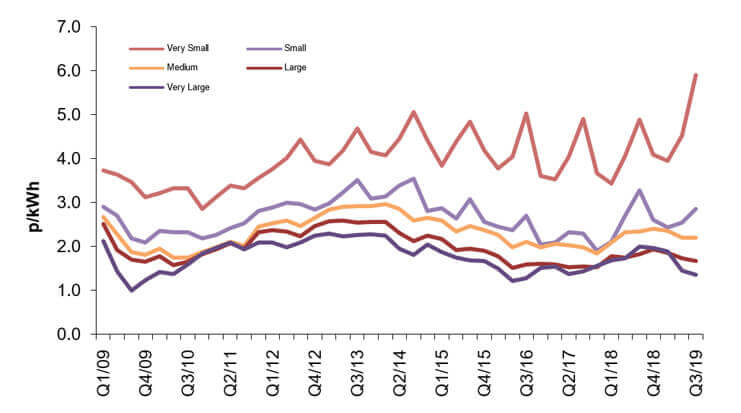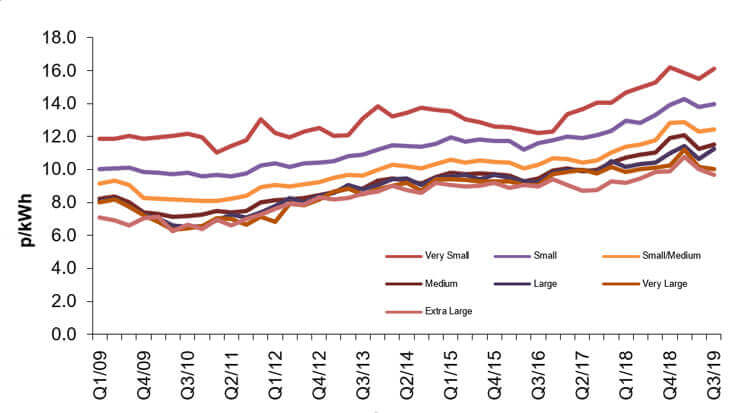| Fuel | Size of consumer | 1st quarter | 2st quarter | 3st quarter |
|---|---|---|---|---|
| Electricity | ||||
| Very Small | 15.84 | 15.49 | 16.09 | |
| Small | 14.25 | 13.76 | 13.95 | |
| Small/Medium | 12.85 | 12.31 | 12.44 | |
| Medium | 12.09 | 11.24 | 11.51 | |
| Large | 11.41 | 10.62 | 11.25 | |
| Very Large | 11.18 | 10.13 | 10.01 | |
| Extra Large | 10.77 | 10.00 | 9.68 | |
| Average | 12.37 | 11.62 | 11.66 | |
| Gas | ||||
| Very Small | 3.952 | 4.521 | 5.895 | |
| Small | 2.437 | 2.541 | 2.859 | |
| Medium | 2.355 | 2.202 | 2.197 | |
| Large | 1.849 | 1.720 | 1.659 | |
| Very Large | 1.881 | 1.448 | 1.357 | |
| Average | 2.450 | 2.302 | 2.250 |
| Fuel | Size of consumer | 1st quarter | 2st quarter | 3st quarter | 4st quarter |
|---|---|---|---|---|---|
| Electricity | |||||
| Very Small | 14.64 | 14.97 | 15.26 | 16.18 | |
| Small | 12.94 | 12.84 | 13.32 | 13.93 | |
| Small/Medium | 11.38 | 11.49 | 11.75 | 12.81 | |
| Medium | 10.72 | 10.89 | 11.03 | 11.91 | |
| Large | 10.16 | 10.33 | 10.39 | 11.00 | |
| Very Large | 9.85 | 10.00 | 10.09 | 10.26 | |
| Extra Large | 9.18 | 9.43 | 9.83 | 9.87 | |
| Average | 11.06 | 11.12 | 11.35 | 11.94 | |
| Gas | |||||
| Very Small | 3.430 | 4.053 | 4.883 | 4.088 | |
| Small | 2.099 | 2.697 | 3.277 | 2.601 | |
| Medium | 2.090 | 2.325 | 2.330 | 2.395 | |
| Large | 1.770 | 1.736 | 1.822 | 1.924 | |
| Very Large | 1.675 | 1.721 | 1.999 | 1.962 | |
| Average | 2.188 | 2.362 | 2.442 | 2.458 |
| Fuel | Size of consumer | 1st quarter | 2st quarter | 3st quarter | 4st quarter |
|---|---|---|---|---|---|
| Electricity | |||||
| Very Small | 13.34 | 13.67 | 14.06 | 14.03 | |
| Small | 12.00 | 11.91 | 12.07 | 12.35 | |
| Small/Medium | 10.63 | 10.43 | 10.52 | 11.01 | |
| Medium | 10.06 | 9.90 | 9.96 | 10.39 | |
| Large | 9.98 | 9.96 | 9.84 | 10.49 | |
| Very Large | 9.84 | 9.96 | 9.77 | 10.17 | |
| Extra Large | 9.07 | 8.72 | 8.73 | 9.29 | |
| Average | 10.55 | 10.38 | 10.38 | 10.89 | |
| Gas | |||||
| Very Small | 3.529 | 4.037 | 4.892 | 3.665 | |
| Small | 2.079 | 2.318 | 2.286 | 1.900 | |
| Medium | 2.050 | 2.024 | 1.978 | 1.836 | |
| Large | 1.583 | 1.522 | 1.543 | 1.522 | |
| Very Large | 1.536 | 1.363 | 1.430 | 1.550 | |
| Average | 2.133 | 2.128 | 2.036 | 1.979 |
| Fuel | Size of consumer | 1st quarter | 2st quarter | 3st quarter | 4st quarter |
|---|---|---|---|---|---|
| Electricity | |||||
| Very Small | 12.56 | 12.39 | 12.22 | 12.31 | |
| Small | 11.71 | 11.21 | 11.59 | 11.78 | |
| Small/Medium | 10.41 | 10.07 | 10.27 | 10.66 | |
| Medium | 9.63 | 9.27 | 9.44 | 9.92 | |
| Large | 9.48 | 9.27 | 9.23 | 9.79 | |
| Very Large | 9.27 | 9.07 | 9.06 | 9.71 | |
| Extra Large | 8.88 | 9.04 | 8.96 | 9.41 | |
| Average | 10.17 | 9.92 | 9.99 | 10.43 | |
| Gas | |||||
| Very Small | 3.773 | 4.046 | 5.021 | 3.606 | |
| Small | 2.441 | 2.361 | 2.692 | 2.040 | |
| Medium | 2.254 | 1.981 | 2.101 | 1.974 | |
| Large | 1.771 | 1.514 | 1.584 | 1.607 | |
| Very Large | 1.497 | 1.208 | 1.270 | 1.502 | |
| Average | 2.418 | 2.232 | 2.236 | 2.130 |
| Fuel | Size of consumer | 1st quarter | 2st quarter | 3st quarter | 4st quarter |
|---|---|---|---|---|---|
| Electricity | |||||
| Very Small | 13.53 | 13.06 | 12.85 | 12.60 | |
| Small | 11.92 | 11.68 | 11.81 | 11.73 | |
| Small/Medium | 10.59 | 10.42 | 10.56 | 10.47 | |
| Medium | 9.81 | 9.72 | 9.75 | 9.70 | |
| Large | 9.56 | 9.66 | 9.41 | 9.66 | |
| Very Large | 9.39 | 9.37 | 9.28 | 9.27 | |
| Extra Large | 9.03 | 8.98 | 9.03 | 9.19 | |
| Average | 10.35 | 10.18 | 10.16 | 10.24 | |
| Gas | |||||
| Very Small | 3.837 | 4.378 | 4.832 | 4.184 | |
| Small | 2.861 | 2.630 | 3.068 | 2.549 | |
| Medium | 2.584 | 2.339 | 2.456 | 2.367 | |
| Large | 2.165 | 1.919 | 1.952 | 1.894 | |
| Very Large | 1.875 | 1.737 | 1.674 | 1.668 | |
| Average | 2.762 | 2.597 | 2.652 | 2.522 |
| Fuel | Size of consumer | 1st quarter | 2st quarter | 3st quarter | 4st quarter |
|---|---|---|---|---|---|
| Electricity | |||||
| Very Small | 13.20 | 13.42 | 13.72 | 13.60 | |
| Small | 11.44 | 11.42 | 11.36 | 11.53 | |
| Small/Medium | 10.28 | 10.19 | 10.08 | 10.34 | |
| Medium | 9.46 | 9.30 | 9.12 | 9.52 | |
| Large | 9.39 | 9.46 | 9.06 | 9.50 | |
| Very Large | 9.02 | 9.19 | 8.70 | 9.39 | |
| Extra Large | 9.03 | 8.74 | 8.56 | 9.18 | |
| Average | 10.06 | 9.94 | 9.85 | 10.18 | |
| Gas | |||||
| Very Small | 4.067 | 4.445 | 5.063 | 4.411 | |
| Small | 3.140 | 3.383 | 3.540 | 2.803 | |
| Medium | 2.959 | 2.859 | 2.586 | 2.654 | |
| Large | 2.560 | 2.144 | 2.111 | 2.247 | |
| Very Large | 2.246 | 1.916 | 1.812 | 2.044 | |
| Average | 3.061 | 2.850 | 2.739 | 2.820 |
| Fuel | Size of consumer | 1st quarter | 2st quarter | 3st quarter | 4st quarter |
|---|---|---|---|---|---|
| Electricity | |||||
| Very Small | 12.03 | 12.09 | 13.07 | 13.81 | |
| Small | 10.52 | 10.79 | 10.89 | 11.19 | |
| Small/Medium | 9.48 | 9.65 | 9.63 | 9.96 | |
| Medium | 8.62 | 8.82 | 8.82 | 9.34 | |
| Large | 8.55 | 9.06 | 8.80 | 9.06 | |
| Very Large | 8.65 | 8.84 | 8.50 | 8.77 | |
| Extra Large | 8.19 | 8.26 | 8.51 | 8.68 | |
| Average | 9.29 | 9.46 | 9.45 | 9.92 | |
| Gas | |||||
| Very Small | 3.867 | 4.175 | 4.673 | 4.153 | |
| Small | 2.977 | 3.223 | 3.511 | 3.089 | |
| Medium | 2.840 | 2.906 | 2.908 | 2.914 | |
| Large | 2.577 | 2.588 | 2.539 | 2.550 | |
| Very Large | 2.290 | 2.224 | 2.259 | 2.270 | |
| Average | 2.938 | 3.028 | 2.980 | 2.954 |
| Fuel | Size of consumer | 1st quarter | 2st quarter | 3st quarter | 4st quarter |
|---|---|---|---|---|---|
| Electricity | |||||
| Very Small | 12.20 | 11.96 | 12.30 | 12.52 | |
| Small | 10.36 | 10.14 | 10.39 | 10.40 | |
| Small/Medium | 9.05 | 8.95 | 9.08 | 9.24 | |
| Medium | 8.11 | 8.18 | 8.27 | 8.46 | |
| Large | 7.78 | 8.26 | 7.99 | 8.41 | |
| Very Large | 6.80 | 7.91 | 7.84 | 8.20 | |
| Extra Large | 7.62 | 7.92 | 7.86 | 8.29 | |
| Average | 8.90 | 8.85 | 8.84 | 9.17 | |
| Gas | |||||
| Very Small | 3.752 | 4.009 | 4.425 | 3.953 | |
| Small | 2.883 | 2.988 | 2.955 | 2.839 | |
| Medium | 2.525 | 2.579 | 2.466 | 2.655 | |
| Large | 2.361 | 2.336 | 2.222 | 2.461 | |
| Very Large | 2.093 | 1.978 | 2.087 | 2.247 | |
| Average | 2.757 | 2.765 | 2.640 | 2.794 |
| Fuel | Size of consumer | 1st quarter | 2st quarter | 3st quarter | 4st quarter |
|---|---|---|---|---|---|
| Electricity | |||||
| Very Small | 11.01 | 11.41 | 11.78 | 13.04 | |
| Small | 9.65 | 9.56 | 9.75 | 10.22 | |
| Small/Medium | 8.09 | 8.23 | 8.39 | 8.92 | |
| Medium | 7.46 | 7.40 | 7.46 | 7.99 | |
| Large | 6.93 | 7.24 | 7.07 | 7.39 | |
| Very Large | 7.03 | 7.01 | 6.64 | 7.14 | |
| Extra Large | 6.96 | 6.58 | 6.98 | 7.26 | |
| Average | 8.13 | 8.06 | 8.12 | 8.68 | |
| Gas | |||||
| Very Small | 3.120 | 3.388 | 3.313 | 3.555 | |
| Small | 2.263 | 2.409 | 2.518 | 2.799 | |
| Medium | 1.982 | 2.094 | 2.012 | 2.451 | |
| Large | 1.933 | 2.072 | 1.939 | 2.317 | |
| Very Large | 1.959 | 2.091 | 1.933 | 2.089 | |
| Average | 2.204 | 2.288 | 2.144 | 2.552 |
| Fuel | Size of consumer | 1st quarter | 2st quarter | 3st quarter | 4st quarter |
|---|---|---|---|---|---|
| Electricity | |||||
| Very Small | 11.97 | 12.02 | 12.14 | 11.94 | |
| Small | 9.78 | 9.70 | 9.78 | 9.59 | |
| Small/Medium | 8.24 | 8.17 | 8.15 | 8.07 | |
| Medium | 7.30 | 7.11 | 7.16 | 7.27 | |
| Large | 7.04 | 6.59 | 6.50 | 6.56 | |
| Very Large | 6.83 | 6.34 | 6.43 | 6.57 | |
| Extra Large | 7.11 | 6.24 | 6.64 | 6.40 | |
| Average | 8.47 | 8.15 | 8.21 | 8.14 | |
| Gas | |||||
| Very Small | 3.205 | 3.322 | 3.326 | 2.857 | |
| Small | 2.357 | 2.314 | 2.323 | 2.173 | |
| Medium | 1.940 | 1.742 | 1.742 | 1.863 | |
| Large | 1.775 | 1.568 | 1.642 | 1.827 | |
| Very Large | 1.418 | 1.361 | 1.593 | 1.840 | |
| Average | 2.151 | 1.927 | 1.898 | 2.057 |
| Fuel | Size of consumer | 1st quarter | 2st quarter | 3st quarter | 4st quarter |
|---|---|---|---|---|---|
| Electricity | |||||
| Very Small | 11.87r | 11.86 | 12.05 | 11.87r | |
| Small | 10.04r | 10.05 | 10.11 | 9.84r | |
| Small/Medium | 9.14r | 9.33 | 9.06 | 8.25r | |
| Medium | 8.24r | 8.36 | 7.98 | 7.40r | |
| Large | 8.08r | 8.23 | 7.73 | 7.26 | |
| Very Large | 8.00r | 8.18 | 7.72 | 7.23 | |
| Extra Large | 7.07r | 6.89 | 6.61 | 7.06 | |
| Average | 9.06r | 9.13 | 8.85 | 8.56r | |
| Gas | |||||
| Very Small | 3.727 | 3.630 | 3.458 | 3.116 | |
| Small | 2.892 | 2.703 | 2.184 | 2.079 | |
| Medium | 2.672 | 2.276r | 1.869 | 1.803 | |
| Large | 2.501 | 1.909r | 1.700 | 1.653 | |
| Very Large | 2.124 | 1.436r | 0.998 | 1.224 | |
| Average | 2.795 | 2.405r | 1.860 | 1.935 |
| Fuel | Size of consumer | 1st quarter | 2st quarter | 3st quarter | 4st quarter |
|---|---|---|---|---|---|
| Electricity | |||||
| Very Small | 9.75 | 9.86 | 10.45 | 11.29 | |
| Small | 8.26 | 8.28 | 8.81 | 9.77 | |
| Small/Medium | 7.26 | 7.26 | 7.76 | 9.77 | |
| Medium | 6.37 | 6.73 | 7.18 | 9.23 | |
| Large | 6.28 | 6.61 | 7.01 | 8.84 | |
| Very Large | 6.46 | 6.86 | 7.11 | 9.36 | |
| Extra Large | 5.65 | 6.15r | 6.30r | 7.67 | |
| Average | 7.12 | 7.43 | 7.81 | 9.45 | |
| Gas | |||||
| Very Small | 2.927 | 2.945 | 3.168 | 3.548 | |
| Small | 2.347 | 2.375 | 2.480 | 2.954 | |
| Medium | 1.962 | 2.150 | 2.222 | 2.651 | |
| Large | 1.862 | 2.059 | 2.148 | 2.566 | |
| Very Large | 1.743 | 2.053 | 2.085 | 2.286 | |
| Average | 2.141 | 2.253 | 2.301 | 2.782 |
| Fuel | Size of consumer | 1st quarter | 2st quarter | 3st quarter | 4st quarter |
|---|---|---|---|---|---|
| Electricity | |||||
| Very Small | 9.27 | 9.57 | 9.67 | 9.67 | |
| Small | 7.97 | 7.29 | 7.99 | 8.09 | |
| Small/Medium | 7.75 | 6.59 | 7.20 | 7.15 | |
| Medium | 7.00 | 6.23 | 6.26 | 6.32 | |
| Large | 6.61 | 5.74 | 5.92 | 6.01 | |
| Very Large | 6.69 | 5.62 | 5.63 | 5.81 | |
| Extra Large | 6.32 | 4.76 | 4.19 | 5.35 | |
| Average | 7.39 | 6.49 | 6.63 | 6.87 | |
| Gas | |||||
| Very Small | 2.816r | 2.621 | 2.580 | 2.651 | |
| Small | 2.621r | 2.260 | 1.919 | 2.234 | |
| Medium | 2.151r | 1.811 | 1.543 | 1.800 | |
| Large | 1.894 | 1.376 | 1.291 | 1.588 | |
| Very Large | 1.374 | 0.968 | 1.048 | 1.512 | |
| Average | 2.164r | 1.718 | 1.516 | 1.908 |
| Fuel | Size of consumer | 1st quarter | 2st quarter | 3st quarter | 4st quarter |
|---|---|---|---|---|---|
| Electricity | |||||
| Very Small | 7.30 | 7.88 | 8.53 | 9.10 | |
| Small | 6.54 | 6.66 | 7.04 | 7.76 | |
| Small/Medium | 6.66 | 6.48 | 6.60 | 7.73 | |
| Medium | 5.98 | 5.91 | 5.85 | 6.97 | |
| Large | 5.88 | 5.65 | 5.68 | 6.56 | |
| Very Large | 5.00 | 5.01 | 5.03 | 5.49 | |
| Extra Large | |||||
| Average | 6.09 | 6.10 | 6.24 | 7.03 | |
| Gas | |||||
| Very Small | 2.266 | 2.173 | 2.442 | 2.623 | |
| Small | 2.303 | 2.126 | 2.244 | 2.364 | |
| Medium | 2.282 | 1.941 | 2.037 | 1.982 | |
| Large | 2.317 | 1.743 | 1.666 | 1.847 | |
| Very Large | 2.016 | 1.412 | 1.281 | 1.447 | |
| Average | 2.255 | 1.858 | 1.820 | 2.012 |
| Fuel | Size of consumer | 1st quarter | 2st quarter | 3st quarter | 4st quarter |
|---|---|---|---|---|---|
| Electricity | |||||
| Very Small | 6.29 | 6.56 | 6.79 | 6.98 | |
| Small | 5.57 | 5.57 | 5.74 | 6.32 | |
| Small/Medium | 4.91 | 4.91 | 5.09 | 6.06 | |
| Medium | 4.27 | 4.25 | 4.36 | 5.53 | |
| Large | 4.10 | 4.06 | 4.08 | 5.04 | |
| Very Large | 3.63 | 3.68 | 3.88 | 4.58 | |
| Extra Large | |||||
| Average | 4.57 | 4.60 | 4.74 | 5.52 | |
| Gas | |||||
| Very Small | 1.709 | 1.761 | 1.777 | 1.989 | |
| Small | 1.612 | 1.761 | 1.709 | 1.993 | |
| Medium | 1.495 | 1.656 | 1.505 | 1.897 | |
| Large | 1.370 | 1.350 | 1.260 | 1.769 | |
| Very Large | 1.242 | 1.243 | 1.143 | 1.945 | |
| Average | 1.488 | 1.561 | 1.443 | 1.910 |
| Fuel | Size of consumer | 1st quarter | 2st quarter | 3st quarter | 4st quarter |
|---|---|---|---|---|---|
| Electricity | |||||
| Very Small | 5.84 | 5.91 | 6.07 | 6.14 | |
| Small | 5.09 | 4.91 | 4.43 | 4.35 | |
| Small/Medium | 3.75 | 3.82 | 3.59 | 4.51 | |
| Medium | 3.30 | 3.30 | 3.39 | 3.97 | |
| Large | 3.14 | 3.04 | 3.39 | 3.93 | |
| Very Large | 2.76 | 2.65 | 2.93 | 3.63 | |
| Extra Large | |||||
| Average | 3.72 | 3.59 | 3.66 | 4.46 | |
| Gas | |||||
| Very Small | 1.488 | 1.363 | 1.598 | 1.370 | |
| Small | 1.295 | 1.221 | 1.445 | 1.303 | |
| Medium | 1.078 | 1.185 | 1.144 | 1.250 | |
| Large | 0.982 | 0.987 | 0.862 | 1.140 | |
| Very Large | 0.844 | 1.025 | 0.953 | 0.992 | |
| Average | 1.162 | 1.151 | 1.150 | 1.224 |






























 Processing your quotation. Please Wait....
Processing your quotation. Please Wait....